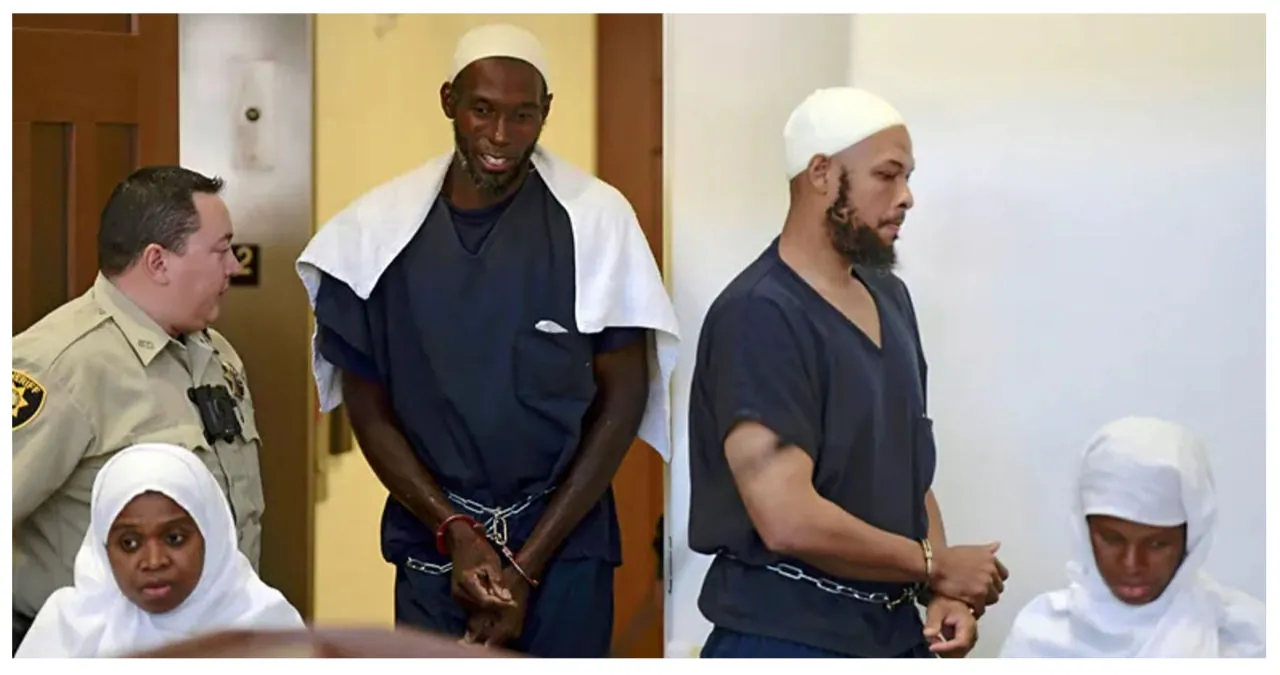Four family members have been sentenced to life in prison by a U.S. judge. Their convictions are related to a federal terrorism and kidnapping case that started in 2017. The case began with the search for a missing toddler from Georgia, who was tragically discovered dead during a raid on a squalid compound in northern New Mexico.
Months after a jury found the four defendants guilty, they have now been sentenced for what prosecutors described as a “sick end-of-times scheme.”
The defendants’ constitutional rights were not violated, despite their arguments. This will be just one of the points they will raise when appealing their convictions. During the trial, they claimed that the case was a result of “government overreach” and that they were singled out due to their Muslim identity.
Jany Leveille, a Haitian national, managed to avoid participating in the three-week trial last fall by pleading guilty to conspiracy to provide material support to terrorists and possession of a firearm while unlawfully in the United States. In accordance with her plea agreement, she could have faced a maximum sentence of 17 years in prison.
Judge William Johnson handed down a 15-year sentence, acknowledging that Leveille had been undergoing treatment for acute schizophrenia since her arrest in 2018. Early on, she had undergone competency evaluations and started taking medication to manage her mental illness.
According to the judge, the facts of the case are extremely disturbing. However, what sets Ms. Leveille apart is that she is the first defendant to show any willingness to take responsibility for her actions. The judge highlighted the significance of Leveille’s apology to the toddler’s mother and her co-defendants.
During the trial, Leveille’s writings about the plans were introduced as evidence. She was portrayed as a spiritual leader for the group.
On her 41st birthday, Leveille stood before the court, expressing remorse for the consequences that occurred due to her delusions and the voices she once heard. She acknowledged that with a clearer mind, it now sickens her to reflect on the events that unfolded.
According to prosecutors, it is crucial for Leveille to acknowledge her responsibility in the matter. However, it remains uncertain when her mental health problems started to become apparent, and whether they existed prior to the family’s trip to New Mexico.
Siraj Ibn Wahhaj, the father of the boy and Leveille’s partner, has been found guilty of three terrorism-related charges. Lucas Morton, Wahhaj’s brother-in-law, has also been convicted of terrorism charges, as well as conspiracy to commit kidnapping and kidnapping that led to the death of the boy. Hujrah and Subhanah Wahhaj, Wahhaj’s two sisters, have been convicted solely on the charges of kidnapping.
The defense attorneys contended that the crimes their clients were accused of committing did not warrant a life sentence and that the sisters had no control over the situation. The prosecutors, on the other hand, challenged these arguments.
According to Johnson, he had to adhere to the federal kidnapping statute, which imposes a minimum sentence of life imprisonment in cases where the offense leads to a fatality. This statute has been in existence for almost a century since the notorious kidnapping of Charles Lindbergh’s son and his wife, Anne.
According to Johnson, federal sentencing statutes have undergone changes, but there is established precedent from the U.S. Supreme Court and other circuit courts regarding judges’ discretion in these situations. Prosecutors also highlighted that there have been no federal cases where the mandatory sentence for a deadly kidnapping has been overturned based on constitutional concerns.
Jurors were presented with a complex case that had taken years to reach trial. Throughout the trial, they listened to weeks of testimony from various individuals, including children who had resided at the compound, family members, firearms experts, doctors, and forensic technicians.
The exact cause of death remains unknown, with allegations that the boy, who suffered from frequent seizures, was denied essential medication.
In an emotional video appearance on Wednesday, Hakima Ramzi, the mother of Abdul-Ghani, tearfully appealed to the judge, urging them to impose the harshest possible sentence.
In court on Wednesday, the boy’s grandfather, Siraj Wahhaj, a renowned Muslim cleric who leads a prominent New York City mosque, conveyed a straightforward message to his children and the other defendants.
“I want you to know that I forgive you,” said the elder Wahhaj, expressing his belief that they did not have any intention for the boy to lose his life. “We are all human and we are bound to make mistakes.”
Tears welled up in his daughters’ eyes as Leveille bowed her head in sorrow.

